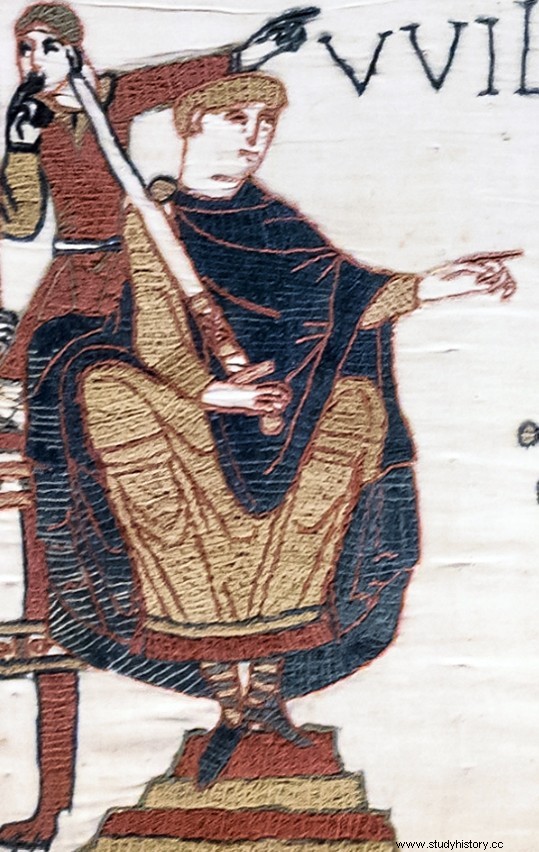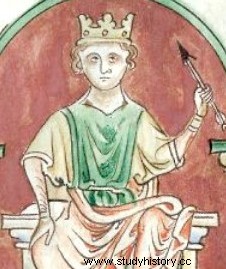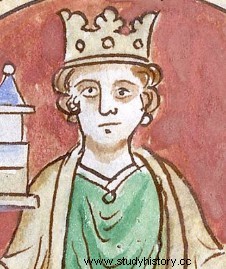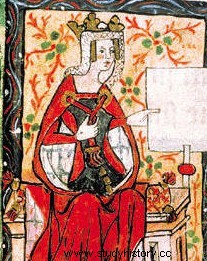Just as Japan has the Kamakura period and the Muromachi period, there are several period divisions in British history.
This time I would like to summarize the history of the Norman dynasty in England, which lasted from 1066 to 1154.
Norman Conquest

The beginning of the Norman dynasty begins when Guillaume, Duke of Normandy, becomes King of England.
Prior to that, Britain was dominated by the Dane dynasty, which was built by the current Danes, the Danes, who died only seven years after the death of the founder Knut, and was the royal family before that. The descendant of the Wessex royal family, the Holy King Edward, reigned as the puppet of the Earl of Wessex.
Well, it's a really confusing translation.
In terms of history alone, the history of England is as follows.
Roman rule ⇒ Celtic and Germanic warring era after the withdrawal of Rome ⇒ 7 kingdom era when the Anglo-Saxon tribe of the Germanic tribe built 7 kingdoms ⇒ 7 kingdoms unified by King Wessex ⇒ Dane dynasty ⇒ Edward's Testimony ⇒Now
Edward the Conqueror was born and raised in the Duchy of Normandy, France, the home of his mother Emma, and after the death of the king, Guillaume, who was the Duchy of Normandy, landed in England claiming succession to the throne and landed in England at the Battle of Hastings. After winning and occupying London, Guillaume changed his name to William the Conqueror and became King of England.
The lords rebelled against this, but all were suppressed. The land of the princes of England was confiscated and distributed to the French aristocrats who surrounded William the Conqueror.
England was dominated by the French, both centrally and locally, but help came from a surprising direction.
King Philip I of France is wary of William the Conqueror's forces, burning his son Robert to rebel against his father, and William the Conqueror dies in a series of battles with his son.
The coronation and death of William II (Red Face King)

The site of William the Conqueror was succeeded by his third son, Guillaume, and became William II. Robert, the eldest son (who succeeded the Duke of Normandy), was very dissatisfied with this, and the two would be in conflict.
However, a big incident occurs that melts the two who are in conflict.
In 1095, Pope Urban II organized the First Crusade.
Robert, who became the Duke of Normandy, participated in this, and his younger brother William II acted for the Duke of Normandy while he was away.
And after Robert returns, a mysterious incident occurs. William II went hunting and died in the arrow shot by his vassal.
There is an assassination theory from ancient times, but the truth is unknown.
In fact, William the Conqueror had another child. He is called Henri.
As soon as Henri heard that his brother had died, he had a coronation at Westminster Abbey and was crowned Henry I. It is said that Henri was accompanied by hunting when William II died, and Henri's assassination theory still remains, but there is no evidence.
In any case, Henri was crowned Henry I.
Henry I era

Robert, Duke of Normandy, dissatisfied with this and landed in Portsmouth in 1101.
The two did not clash militarily, and Henry I was granted sovereignty over England by paying his brother 3000 marks each year, but this time the English forces rebelled against Henry I. Set up.
Suppressing these rebellions, Henry I bought the nobles of the Duchy of Normandy, defeated his brother Robert in the Battle of Tinchebray in 1106, and became the Duchy of Normandy.
The defeated Robert will be in captivity for the next 28 years and will survive until 1134.
Is it a causal retribution that the man who killed his father is defeated by his younger brother and spends his life as a prisoner?
Henry I, King of England, who also served as the Duke of Normandy, set up the Court Finance Office (Chamber) and formed the Minister of Personnel (Chanseri) to draft important documents. It can be said that it was Henry I's policy that the history of England began to be recorded in detail from this area.
Henry I's income has increased exponentially through a series of policies, amounting to around £ 25,000 a year. William the Conqueror's income is said to be around £ 11,000 a year, which is more than double that.
Henry I, who gained a lot of power, was also troubled by the problem of his successor.
When dealing with history, I run into a battle for successors anyway.
Henry I was married to Scottish Princess Edith, who had four children but survived one boy and one girl. That's all I need, but Henry I had eight children.
In addition, Henry I himself was not granted the Duke of Normandy by the King of France. On the contrary, the King of France espoused Robert's son Guillaume to the Duke of Normandy.
The war began between King Louis VI of France and Henry I, and when Henry I won the Battle of Premure in 1119, he was granted the Duke of Normandy, the son of Henry I.
It seems like I'm going to be happy, but a big incident happens here.
His firstborn, William, was in a marine accident.
Here his successor was Matilda, born to Henry and his wife Edith.
The birth of England's first Queen.
Empress Matilda

The nation of England is "GOD save the Queen".
Queen Victoria was the heyday of the British Empire, and Queen Elizabeth during the Battle of Armada, when Britain became the champion of the sea, and her glory is likely to always come from the Queen, but not the first Queen Matilda. There wasn't.
However, because Matilda was once the queen of Holy Roman Emperor Henry V, she was not called the Queen and she was called the Empress.
At the same time as her coronation, she remarried the French aristocrat, Count of Anjou, who was fourteen years younger, and a child named Henri was born between them.
However, around this time, her father, Henry I, died, and a French aristocrat who claimed succession rights rushed to England.
Since the mother of Etienne, Count of Boulogne, was Henry I's sister, he immediately landed in England upon hearing the news, and with the support of his younger brother, Archbishop Winchester, churches throughout England became the throne of Etienne. Insisted on succession.
Although Matilda himself was strong and not so well-liked by the princes, the princes of England also accepted Etienne, and she was crowned King Stephen of England.
Civil War Era
Matilda wasn't the kind of person who could easily withdraw.
The two are in a fierce conflict, and the uncle of Matilda, King David I of Scotland, also participates in the war, and Britain enters a state of civil war.
Matilda's side was King Scotland and her husband Geoffrey, Count of Anjou, who was recognized by the King of France as the Duke of Normandy, and Matilda's army succeeded in capturing Stephen in the Battle of Lincoln. However, she is denied the crowning ceremony by the church.
In addition, Stephen's princess was also called Matilda, and she was also a considerable maiden. Stephen's army, led by her princess Matilda, is strong and captures Empress Matilda's younger brother Robert, who exchanges prisoners.
The battle between the two armies was unstoppable, and 16 years had passed since the beginning of the war. In 1147, when Robert, a leading Empress sect, died, Empress Matilda quickly lost his motivation and headed for France. Perhaps she wasn't in the land of England anymore, she hasn't set foot in the land of England ever since.
It was her son Henri who succeeded Empress Matilda. Henri took over the position of Duke of Normandy from his father in 1151 and was acknowledged by King Louis VII of France.
Shortly thereafter, Joflois died, and Henri took over the position of Count of Anjou.
The following year, Louis VII divorced his wife, Eleanor, and she was married to Henri. She also has the right to inherit a nobleman with a large land in France, and Henri became the largest landlord of the European continent at the age of only 19.
It was Louis VII who opposed this.
Henri had to deal with the King of France on the continent and the King of England at the same time in England.
However, when Justas, the son of King Stephen of England, suddenly disappeared, Stephen mourned and the Treaty of Westminster was signed with Henri. The content was that Stephen was the King of England for the rest of his life, but the next King of England was Henri, and Stephen's other son, William, would become the next Duke of Normandy.
In 1154 Stephen died.
As per the treaty, Henri became king.
The birth of Henry II of Plantagenet.
